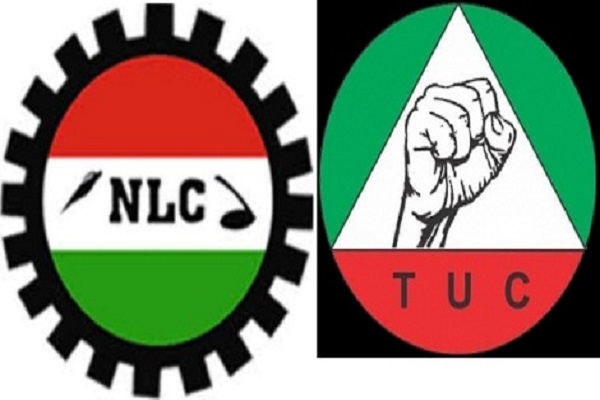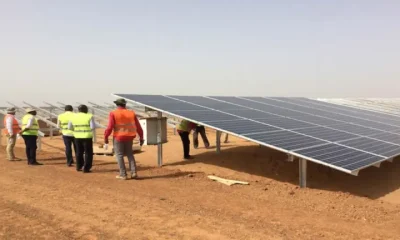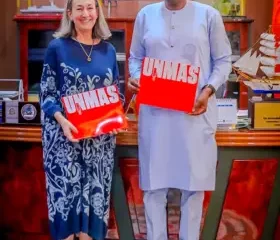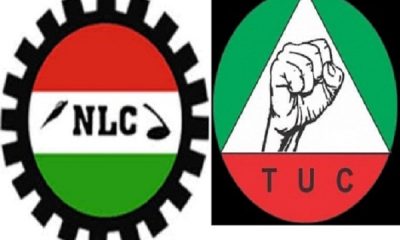Headline
Court Extends Order Restraining NLC, TUC From Embarking On Strike

The National Industrial Court on Monday declared that the order restraining the Nigeria Labour Congress (NLC) and Trade Union Congress (TUC) from embarking on their planned industrial action subsists.
Justice Olufunke Anuwe stated that the order as granted on June 5 subsists pending the hearing and determination of the motion on notice.
The court in addition ordered that parties maintain status quo and adjourned the matter until July 20, for hearing.
Earlier, when the case was called, the Federal Government’s counsel, Mr Ochum Emmanuel informed the court that the matter was slated for Monday for the claimant to take its motion on notice for an interlocutory injunction to restrain the defendants from embarking on strike.
He added that he was ready to proceed with his application as the defendants had been served.
Mr Marshall Abubakar, the defendants’ counsel on his part however replied that they had filed an application praying the court to set aside its order granted on June 5, restraining his clients from embarking on strike.
Abubakar further submitted that the claimant was served the application on June 8, only for them to turn around and serve on them a counter-affidavit on Monday in court.
He added that the claimant filed the counter-affidavit on June 16 and instructed the bailiff not to serve them until on Monday in court.
The court enquired if defence was properly before the court, Abubakar responded that he was not certain, but that he will find out and do the needful.
He also prayed for a short adjournment in order to look at the counter-affidavit and respond.
Emmanuel in response opposed Abubakar’s application for adjournment and urged the court to allow him take his motion on notice which was slated for hearing.
The counsel also reiterated that the Federal Government will never a file process and instruct any bailiff not to serve the other party.
He argued that it was probably due to the fact that he filed the processes late on June 16 that made the bailiff to serve defence counsel in court on Monday.
Emmanuel in his submission equally averred that the defendants were not properly before the court as they had not filed their memorandum of appearance, but only came to urge the court to vacate the order it granted on June 5.
He stated that the defendants being not properly before the court cannot seek for an adjournment.
In addition, he submitted that if the court should deem it fit to grant Abubakar’s application for an adjournment, the court should equally declare that the order restraining the defendants from embarking on strike granted on June 5 subsist.
In his reply, Abubakar submitted that Emmanuel’s application was not necessary as the court had earlier stated that parties should maintain status quo pending the hearing and determination of the substantive suit.
He also informed the court that parties were meeting later on Monday to try and resolve the issue.
The court in its ruling granted the application for adjournment, directed the defendants to enter their memorandum of appearance and instructed parties to maintain status quo.
From facts, he defendants had planned to embark on nationwide strike on June 7 to protest the fuel subsidy removal that brought about the new pump price for the Premium Motor Spirit.
The federal government had therefore instituted the suit to stop the defendants, stating that the proposed strike may gravely affect the larger society and the well-being of the nation at large.
The claimant in addition stated that the strike is capable of disrupting economic activities,that will affect especially the health and the educational sector.
Headline
EFCC bars dollar transactions, orders embassies to charge in naira

The Economic and Financial Crimes Commission has barred foreign missions based in Nigeria from transacting in foreign currencies and mandated them to use Naira in their financial businesses.
The EFCC has also mandated Nigerian foreign missions domiciled abroad to accept Naira in their financial businesses.
The anti-graft agency said the move is to tackle the dollarisation of the Nigerian economy and the degradation of the naira
The Commission, therefore, asked the government to stop foreign missions in Nigeria from charging visa and other consular services in foreign denominations.
The EFCC gave the advisory in a letter to the Minister of Foreign Affairs, Amb. Yusuf Tuggar, for onward transmission to all foreign missions in the country.
In the letter, the EFCC said it issued the advisory because the practice of paying for consular services in dollars was in conflict with extant laws and financial regulations in Nigeria.
In a letter dated April 5, 2024, which was addressed to the Minister of Foreign Affairs, Ambassador Yusuf Tuggar, titled: “EFCC Advisory to Foreign Missions against Invoicing in US Dollar,” the EFCC Chairman, Ola Olukoyede expressed dismay over the invoicing of consular services in Nigeria by foreign missions in dollars.
The EFCC cited Section 20(1) of the Central Bank of Nigeria Act, 2007, which makes currencies issued by the apex bank the only legal tender in Nigeria.
The letter read, “I present to you the compliments of the Economic and Financial Crimes Commission, and wish to notify you about the commission’s observation, with dismay, regarding the unhealthy practice by some foreign missions to invoice consular services to Nigerians and other foreign nationals in the country in United States dollar ($).
“It states that ‘the currency notes issued by the Bank shall be the legal tender in Nigeria on their face value for the payment of any amount’.
“This presupposes that any transaction in currencies other than the naira anywhere in Nigeria contravenes the law and is, therefore, illegal.”
The commission further stated that the rejection of the naira for consular services in Nigeria by certain missions, along with non-compliance with foreign exchange regulations in determining service costs, is not just unlawful but also undermines the nation’s sovereignty embodied in its official currency.
The letter continues: “This trend can no longer be tolerated, especially in a volatile economic environment where the country’s macroeconomic policies are constantly under attack by all manner of state and non-state actors.
“In light of the above, you may wish to convey the commission’s displeasure to all missions in Nigeria and restate Nigeria’s desire for their operations not to conflict with extant laws and regulations in the country.”
Diplomatic sources said yesterday, May 10, that some embassies were wondering whether the EFCC’s advisory represented the position of the Federal Government.
Headline
Prince Harry visits sick Nigerian soldiers in Kaduna

Prince Harry and his team visited the 44 Nigerian Army Reference Hospital in Kaduna to interact with wounded soldiers who are receiving treatment.
The Duke of Sussex is in Nigeria with his wife to champion the Invictus Games, which Harry founded to aid the rehabilitation of wounded and sick servicemembers and veterans.
Nigeria joined the Invictus Community of Nations in 2022 becoming the first African country to join.
Prince Harry’s visit to Kaduna came 68 years after his late grandmother Queen Elizabeth II visited the state during the time of the late Premier of Northern Region Sir Ahmadu Bello.




-

 Headline2 days ago
Headline2 days agoSuspend cybersecurity levy– Reps to CBN
-

 Headline2 days ago
Headline2 days agoTinubu resumes work after foreign trip
-

 Business2 days ago
Business2 days agoNigeria needs over $2bn to revive Ajaokuta Steel Plant, says Minister
-

 News2 days ago
News2 days agoShan George’s money returned to Zenith Bank account
-

 Entertainment3 hours ago
Entertainment3 hours agoAMVCA Cultural Day: BBNaija’s Neo, Venita win Best Dressed Male, Female
-

 Metro3 hours ago
Metro3 hours agoEx-Sports Minister laments after hospital neglected him for hours over N80000 deposit
-

 Headline3 hours ago
Headline3 hours agoPrince Harry visits sick Nigerian soldiers in Kaduna













